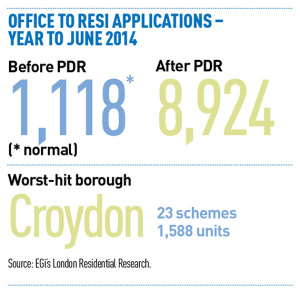 It should have been an easy vote‑winner: drab, derelict, redundant offices turned into shiny, much-needed new homes. Instead, permitted development rights (PDR) have become a battleground between local authorities and central government, with the detractors saying it is a major miscalculation that could see London swallowed up by swathes of substandard bed‑sits.
It should have been an easy vote‑winner: drab, derelict, redundant offices turned into shiny, much-needed new homes. Instead, permitted development rights (PDR) have become a battleground between local authorities and central government, with the detractors saying it is a major miscalculation that could see London swallowed up by swathes of substandard bed‑sits.
The move has attracted headlines about charities being turfed out and small businesses left homeless under rules that allow developers to bypass the formal planning system.
London boroughs have been keen to put a lid on PDR. And with local authorities threatened with being stripped of their business exclusion zone status, it now seems that the one remaining line of defence, Article 4 direction, could end up being worthless.
Office-to-resi conversion rules were only ever meant to be temporary. But, as it became clear that developers’ appetite to convert far outstripped the government’s estimates under the policy, housing minister Brandon Lewis performed a neat political pirouette, labelled the policy a victory and opened a consultation into making the rules permanent. Most controversially under the consultation, business exclusion zones that had protected swathes of central London would be swept away.
The outcome of the consultation, which closed in late September, is not yet known. But, fearing the worst, local authorities have already started the grab for Article 4 directions, which allow them to rule out conversions in specific areas. That last bit is crucial.
Earlier this month, Islington council threatened legal action if communities secretary Eric Pickles did not reverse a decision to cancel its Article 4 direction that would have exempted parts of the borough. Initially, it had asked for the entire borough to be covered, but this was refused.
Richmond, too, looks likely to succeed with an Article 4 direction covering 12 office locations, although Pickles has reportedly instructed the borough to ensure that no projects that have already gained approval are affected by the order. And even Croydon, traditionally famed for being awash with redundant office space, said last month that it had “controversially” decided to implement Article 4 directions (Feature, Croydon pxx).
But there are warnings for those looking to go down the Article 4 route. “It’s going to be a bit of a grab for an Article 4, but it is not an easy option,” warns Julia Chowings, director at Deloitte Real Estate. “Those Article 4s will take a year to deliver and, in that time, developers will be submitting proposals. The one thing that has come out so far is that Article 4s are not retrospective.”
Any borough looking to block proposals during that time will have to pay compensation, says Alex Ground, senior associate at law firm Russell Cooke. “There might be a small window [for developers], but they are very alive to buying properties,” she adds.
That could up the ante on authorities looking to use other legislation to block developments. At present, PDR runs only until May 2016, so what happens if you are half-way through a development?
If you have 10 units and six are converted and four are not, says Ground, those four are at a real risk. A lot will depend on the particular borough, she adds. “Towards the east, they might care less, but I would be very surprised if Islington and Richmond didn’t threaten enforcements.”
The developers seem happy to wait. They think the window of opportunity may already have closed without a concrete extension past the May 2016 deadline.
Criterion Capital recently began consultation on a proposal for what it claims is the UK’s largest private rented sector development. It plans to build 1,500 units at East India Dock, where it originally submitted a PDR application for 431 units.
Iain Murray, director of PRS at the firm, says: “It has allowed us to accelerate our PRS pipeline, but we have completely ground to a halt as a result of the new PDR [consultation].”
He says the company has now moved on to a consented land strategy and adds: “There is no way we can acquire a permitted development property and get it through the process. We don’t have the time available.”
What the industry thinks of PDR
“We’ve seen a lot of permissions [under PDR] but not much activity. Developers seem to be saying ‘we’ve got it done; now let’s get on with what we want to do’.” Adam Challis, JLL
“Many will question why an office-to-residential conversion should be exempt from the obligation to provide affordable housing when new-builds or redevelopments must do so.” Jacqueline Backhaus, Trowers & Hamlins
“Lots of local authorities are trying to resist grade-A space being converted to resi because the values are better. That’s fine, but they ought to be promoting getting bad stock converted to homes.” Tony Hutchinson, Capita
“Developers will not make an investment without weighing up all the options and associated risks. As such, permitted development rights are just another part of the negotiations.” Zac Goodman, TSP
“The fact that residential projects continue to be favoured ahead of commercial development will put further pressure on the office pipeline.” Paul Smith, Colliers International











